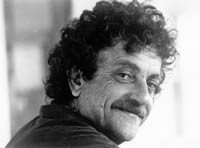American novelist Kurt Vonnegut dies at 84
Kurt Vonnegut, the satirical novelist who captured the absurdity of war and questioned the advances of science in darkly humorous works such as "Slaughterhouse-Five" and "Cat's Cradle," died Wednesday. He was 84.

Vonnegut, who often marveled that he had lived so long despite his lifelong smoking habit, had suffered brain injuries after a fall at his Manhattan home weeks ago, said his wife, photographer Jill Krementz.
The author of at least 19 novels, many of them best-sellers, as well as dozens of short stories, essays and plays, Vonnegut relished the role of a social critic. He lectured regularly, exhorting audiences to think for themselves and delighting in barbed commentary against the institutions he felt were dehumanizing people.
"I will say anything to be funny, often in the most horrible situations," Vonnegut, whose watery, heavy-lidded eyes and unruly hair made him seem to be in existential pain, once told a gathering of psychiatrists.
A self-described religious skeptic and freethinking humanist, Vonnegut used protagonists such as Billy Pilgrim and Eliot Rosewater as transparent vehicles for his points of view. He also filled his novels with satirical commentary and even drawings that were only loosely connected to the plot. In "Slaughterhouse-Five," he drew a headstone with the epitaph: "Everything was beautiful, and nothing hurt."
But much in his life was traumatic, and left him in pain.
Despite his commercial success, Vonnegut battled depression throughout his life, and in 1984, he attempted suicide with pills and alcohol, joking later about how he botched the job, the AP reports.
Vonnegut's books were a mixture of fiction and autobiography, prone to one-sentence paragraphs, exclamation points and italics, the report said.
Some critics said he had invented a new literary type and other accused him of repeating himself, of recycling themes and characters. Some readers found his work incoherent, the Times said.
"Cat's Cradle" was published in 1963 and although it initially sold only about 500 copies it is widely read today in high school English classes, the newspaper said.
Vonnegut's last book, published in 2005, was a collection of biographical essays, "A Man Without a Country." It, too, was a best seller, the newspaper said.
His first play, "Happy Birthday, Wanda June," opened Off Broadway in 1970 to mixed reviews and around the same time he separated from his first wife, Jane, the Times said.
Vonnegut, a fourth-generation German-American, is survived by his wife photographer Jill Krementz, their daughter and his six other children, the New York Times says.
Like Ernest Hemmingway or Walt Whitman, Vonnegut was a journalist before becoming a novelist, an experience that imbued his writing with simplicity and clarity sometimes sneered at by fussier authors or critics, Morse said.
The approach influenced many young writers during the 1960s, including John Irving, author of «The World According to Garp,» who was a student of Vonnegut's in a writer's workshop at the University of Iowa.
Kurt Vonnegut Jr. was born in Indianapolis on Nov. 11, 1922, to Kurt Sr. and Edith Vonnegut. He was the youngest of three children, Bloomberg reports.
Source: agencies
Prepared by Alexander Timoshik
Pravda.ru
Subscribe to Pravda.Ru Telegram channel, Facebook, RSS!




